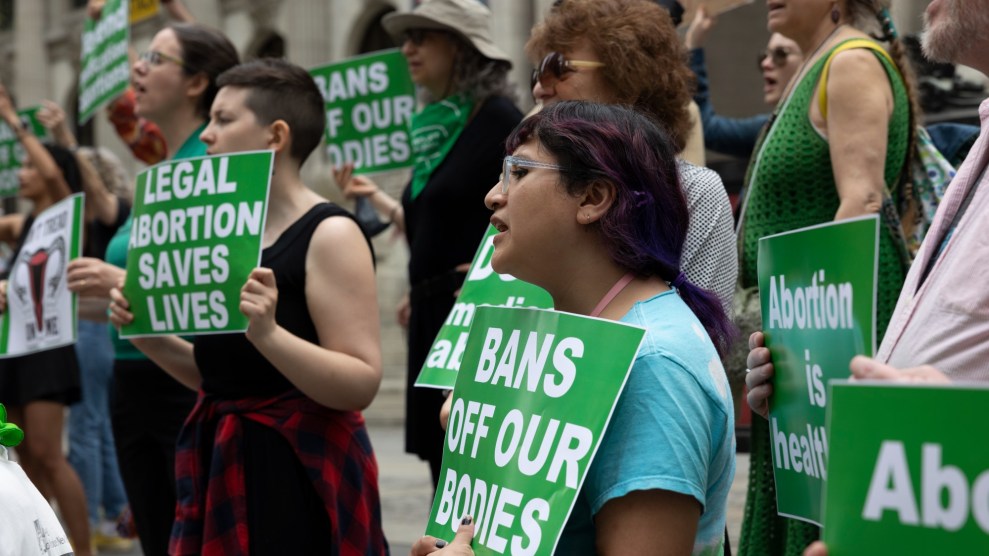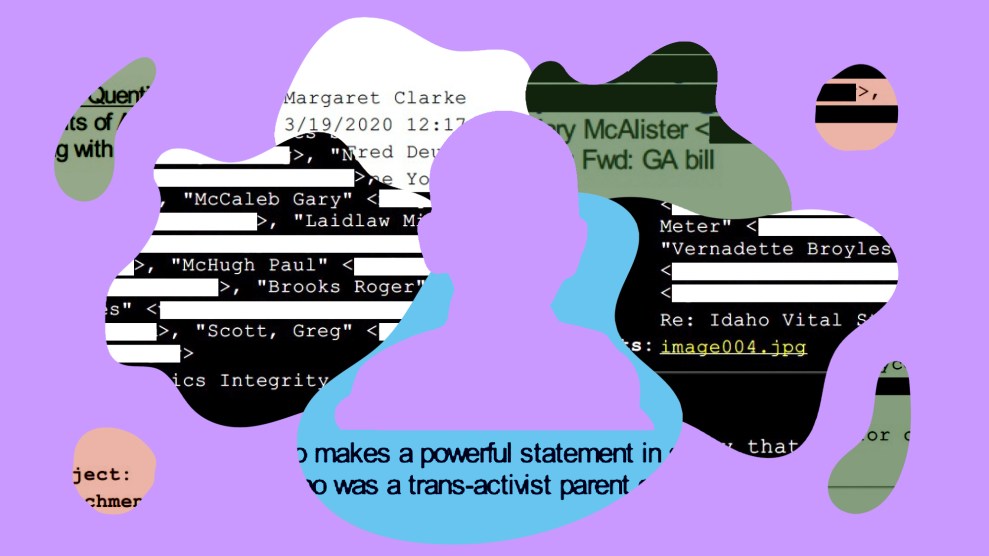
ADF attorney Erin Hawley outside the Supreme Court on March 26, 2024, following oral arguments in a case involving the abortion drug mifepristone.Francis Chung/Politico via AP
The Supreme Court on Wednesday will consider its third major abortion case in two years—and the third brought with the help of a legal nonprofit attempting to infuse American life with its far-right brand of Christianity.
Not only is the group, Alliance Defending Freedom, behind legislation to ban abortion, it is also increasingly representing state governments in their efforts to protect and enforce the bans. The result is an ethically fraught arrangement that puts legal representation of the public in the hands of a religious organization that hauls in more than $100 million per year in tax-exempt donations, largely from undisclosed sources. (Though the group is not required to disclose its donors, the New Yorker reported last year that the family behind the Hobby Lobby craft store—which sued successfully against the contraception coverage mandate in the Affordable Care Act, with ADF’s help—is a significant donor.)
ADF lawyers are now helping Idaho defend its abortion ban against a suit from the Biden administration. The administration claims that Idaho’s law, which criminalizes emergency abortions unless the mother’s life is in danger, conflicts with the Emergency Medical Treatment and Labor Act, a federal law that compels hospitals to provide appropriate care in emergencies. Whether Idaho’s ban can take precedence over federal law will be argued before the Supreme Court on Wednesday, raising the possibility that the justices will allow states to place pregnant people in mortal peril to prevent them from ending their pregnancies.
In December, legal journalist Chris Geidner reported that Idaho attorney general Raul Labrador had brought on ADF to represent the state in three separate matters, including the abortion dispute. ADF is also representing Idaho in a case seeking to enforce its anti-trans bathroom bill and a third brought by multiple Republican attorneys general who aim to thwart a lawsuit by their Democratic counterparts to preserve access to the abortion drug mifepristone. ADF also appears to be representing Idaho in its effort to enforce a ban on gender-affirming care for minors, and according to local press reports, it has consulted on additional Idaho anti-trans bills and other legislation as well.
“ADF has a well rooted presence in Idaho, and that is showing up in legislation, in litigation,” says Cathryn Oakley, senior director of legal policy at the nonprofit Human Rights Campaign. Given the group’s history litigating against rights for LGBTQ people and abortion access, its involvement is not surprising, she told me, although “the extent to which elected representatives are ceding their responsibilities…to unelected far-right folks is a little alarming.”
The contracts Labrador signed with ADF raise ethical concerns. The group is representing Idaho pro bono, which saves taxpayers money, the AG says. But donating services to a state agency or officer may undermine the legislature’s budgetary jurisdiction, and the arrangement allows ADF to advance a religious agenda from a privileged position. This point was raised by University of Texas at Austin Law School professor Stephen Vladeck in his Substack newsletter, One First. State attorneys general, he wrote, enjoy privileges as litigants because they represent the people. But even when ADF represents a state, it is representing its own agenda, and not necessarily the people’s will. (In fact, Idahoans want greater access to abortion.)
The group also benefits from its representation of Idaho by, as the contract stipulates, using “non-confidential information in materials intended to communicate with supporters of ADF and in furtherance of the mission of ADF.” Indeed, the group’s relationship with Labrador’s office is almost certainly attractive to its funders.
Another sign the arrangement may conflict with public interest is that the contract gives ADF some control over the information the AG’s office makes public. Labrador agrees “to consult with ADF regarding public statements related to the Representation and when interacting and communicating with the media.”
ADF has worked since 1994 to deprive LGBTQ people of equal rights, which in 2016 prompted the Southern Poverty Law Center to designate it a “hate group.” Just last year, it won a Supreme Court case that allows some businesses to discriminate against LGBTQ clients. Overall, the group has notched more than a dozen Supreme Court victories, and played an instrumental role in overturning Roe v. Wade. One of its prominent attorneys, Erin Hawley, recently argued the case that could restrict the availability of Mifepristone and is involved in the Idaho abortion case now before the court. In 2016 and then again last year, Mother Jones ran stories detailing how ADF pushes anti-trans bills across the country.
Despite ADF’s efforts to impose far-right Christian values on secular American life, Oakley says, “I think that they have been mainstreamed because the folks who have been in positions of power in these state legislatures, in even the federal government under the Trump administration—many of those peoples have ties to ADF.”
Like many political opponents of abortion rights, ADF doesn’t always broadcast its true goals. After the Supreme Court overturned Roe v. Wade, Hawley told a congressional panel that the Dobbs ruling would not jeopardize emergency care for pregnant women. “An abortion is a situation in which a child is purposefully put to death,” she testified. “Neither miscarriages nor medical emergencies nor ectopic pregnancies involve that situation.” Yet Hawley is defending Idaho’s denial of abortion care during medical emergencies, even though it has been widely reported that the refusal to treat miscarriages, ectopic pregnancies, and other dangerous pregnancy conditions is putting lives in danger.
Part of the mainstreaming Oakley cites involves ADF’s shift from representing private interests to representing public ones. A decade ago, the group successfully defended Greece, New York, in a case that allowed its leaders to open town meetings with a prayer. ADF’s alliances with state and local governments have since expanded. It helped Mississippi defend its abortion ban in the Dobbs case—a ban it helped craft. It also is working closely with West Virginia to defend an anti-trans sports bill, although ADF isn’t representing the state directly. In Oklahoma, the group is defending the Statewide Virtual Charter School Board, a state agency under fire for its decision to award public school funds to a Catholic charter school. (Oklahoma’s attorney general has refused to defend the board, because he believes its actions violate both state and US constitutions.)
ADF describes its mission as protecting religious freedom. For example, its case against mifepristone relies on the moral objections of a handful of doctors who claim they could be called upon to help a person suffering adverse effects from the drug. But in Wednesday’s case, ADF purports to represent the people of Idaho, whatever their religious views.
“They are taking advantage of any vehicle to impose religion into our laws,” says Rachel Laser, president and CEO of Americans United for Church and State, which often litigates opposite ADF in cases involving the mingling of religion and government. “What makes this feel weird is in America, the government is supposed to take as a given that it can’t impose one narrow set of religious views on citizens of all religions.”
By enlisting ADF, Laser adds, state officials are “showing their cards”—namely, they are “seeking to undermine what is a foundational part of our democracy, church-state separation.”

















